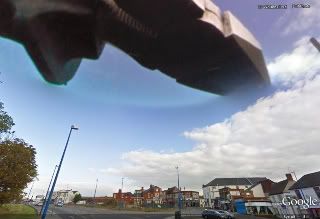Whether you're a Christian looking to deepen your walk with God or barely even know Him, I can't recommend the writings of C.S. Lewis highly enough. They're at once intellectually deep, beautifully persuasive, and purely enjoyable to read in a way I've never seen in more contemporary authors.
The Chronicles of Narnia were a highlight of my childhood (and of many others', no doubt), and I continue to enjoy them and his theological writings today. (And am told I need to read his space trilogy)
As to the purpose of this post: I just finished reading The Great Divorce, an allegorical story depicting a nameless narrator's journey from Hell to Heaven. The central idea of the book is a rejection of the "marriage of Heaven and Hell", the idea that all roads lead to Heaven and that we can get there while keeping the favorite trappings of our earthly lives.
The story starts with the narrator in a dingy town in perpetual twilight. He enters a line at a bus stop, with the bus bound elsewhere. In conversations with other passengers the town is revealed to be an afterlife of sorts, where you can summon any object by simply thinking it. Far from making the town a paradise, people use the ability to make themselves homes far from everyone else since no one can stand each other there.
The bus soon comes up over an enormous cliff to a wondrous country where everything is bigger, fuller, more solid than below and where the sun is just about to rise. For the passengers (who look like ghosts compared to their surroundings) blades of grass are diamond-hard and weigh tons. The rest of the novel is the narrator's accounts of the interactions between the ghosts and the bright, solid 'spirits' who inhabit the land. The selfish motives of the ghosts--pride, greed, lust, self-obsession, possessive love--are revealed in stark contrast to the selflessness and compassion of the spirits, who are people the ghosts had known in life and continually implore their old friends to come with them to the mountains, learning to love this country and its benevolent King.
Always the ghosts have something they cling to that keeps them from accepting the offer of forgiveness and love the spirits extend. One ghost hates the idea of taking moral advice from the spirit of a man who murdered his friend in life. A mother is singularly obsessed with seeing her son again and refuses to trade her possessive love for selfless compassion. Disheartened by what he sees, the narrator begins to question whether it's really possible for a ghost to stay in the land and become solid.
But finally he sees a ghost with a lizard (representing lust) perched on his shoulder, whispering in his ear. As he makes excuses for his companion, an angel is constantly asking him for permission to kill it. When he relents and his lust is killed, he is transformed into a bright spirit and the lizard into a stallion on which he rides off into the mountains. It's the most beautiful story of redemption I've ever read, an illustration of dying to sin and living to God.
Accompanying the narrator on this journey is the spirit of George MacDonald, a theological hero of Lewis' in real life, who provides explanation of the refusal of (most) of the ghosts to look outside themselves and stay. Their obsessions, their refusal to let go of everything they put ahead of God, blinds them to His grace. Explains MacDonald,
"Good beats upon the damned incessantly as sound waves beat on the ears of the deaf, but they cannot receive it. Their fists are clenched, their teeth are clenched, their eyes fast shut. First they will not, in the end they cannot, open their hands for gifts, or their mouth for food, or their eyes to see."
Elsewhere he likens Heaven and Hell less to actual places as to states of mind, of fellowship or separation from God.
"The good man's past begins to change so that his forgiven sins and remembered sorrows take on the quality of Heaven: the bad man's past already conforms to his badness and is filled only with dreariness. And that is why, at the end of all things...the Blessed will say 'We have never lived anywhere except in Heaven,' and the Lost, 'We were always in Hell.' And both will speak truly."
My favorite quote from the book emphasizes that where we end up, Heaven or Hell, is not a surprise, it is a decision we all make.
"There are only two kinds of people in the end: those who say to God, 'Thy will be done,' and those to whom God says, in the end, 'Thy will be done.' All that are in Hell choose it. Without that self-choice there could be no Hell. No one who seriously and constantly desires joy will ever miss it. Those who seek find. To those who knock it is opened."
As Lewis emphasizes in the preface (and MacDonald in the last chapter), the story is not an idea of what Heaven and Hell will literally be like. It's an allegorical picture of what they are, and the choices we all make that determine where we end up. And in this it is one of the most amazing books I've read.
If you rode the bus from Hell to Heaven, what would be nagging at you to go back?






